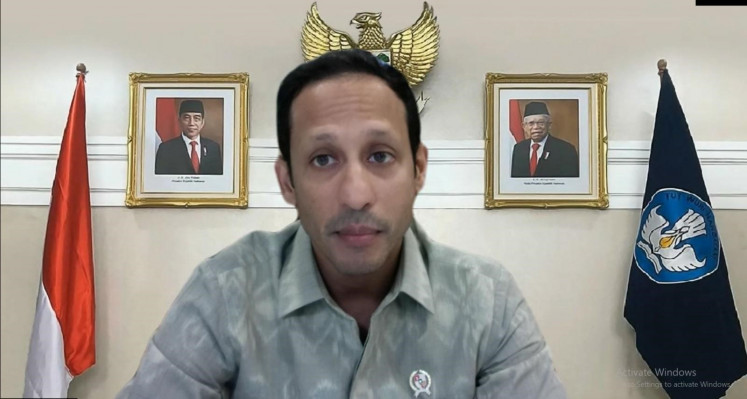Popular Reads
Top Results
Can't find what you're looking for?
View all search resultsPopular Reads
Top Results
Can't find what you're looking for?
View all search resultsEducation, Culture, Research and Tech Ministry launches Regional Education Report 2.0
Providing quality and equitable education across the whole of Indonesia is one of the government’s priority efforts to realize the nation as an advanced country that can be one of the world’s top-four economies by 2050.
Change text size
Gift Premium Articles
to Anyone
P
roviding quality and equitable education across the whole of Indonesia is one of the government’s priority efforts to realize the nation as an advanced country that can be one of the world’s top-four economies by 2050. This effort however, is faced with a slew of challenges for local governments, hindering their ability to identify and reflect an accurate estimate of the achievements of the education provision in their regions, making it difficult to find a clear solution for improvement.
To address this the Education, Culture, Research and Technology Ministry has released the Regional Education Report version 2.0 to assist local governments in evaluating the quality of education within their respective regions in detail.
The report will help them to make data-driven planning and ultimately improve the quality of student learning. The Regional Education Report version 2.0 is an enhancement of the Regional Education Report platform launched last year.
Education, Culture, Research and Technology Minister Nadiem Anwar Makarim stated that the new report clearly indicates the main indicators used to measure the minimum service standards (MSS) index or educational achievement scores. This index can serve as a metric for local governments to measure the quality of education in a particular region.
"The features have been developed from the previous version to facilitate local governments in their planning," said Minister Nadiem during the virtual launch of the Regional Education Report Version 2.0 on July 5.
Nadiem explained that the Regional Education Report Version 2.0 is equipped with the MSS Index and other feature enhancements, that enables data-driven planning that is adjusted to the fulfillment of the education MSS and budgeting in each region.
Additionally, the new report is also equipped with updated features that provide more centralized data, giving deeper insights into the state of educational institutions, integrating this information into the regional planning process.
As for the detailed feature updates in the Regional Education Report Version 2.0, the indicator for educational institution conditions has been reduced to only three colors. Red indicates insufficient, yellow for moderate and green for good condition.
Furthermore, there is a summary page attached to the report containing information regarding the educational conditions in the region, indicating which educational institutions are performing well, areas that need improvement, and program/activity recommendations. The current version of the Regional Education Report Version 2.0 also includes a root cause page with achievement deltas from the previous year and the distribution of the top- and bottom-10 educational institutions.
On the root cause page, local governments can identify priority indicators for improvement in their educational institutions. The distribution of root causes based on achievement per district/city can also be observed.
Additionally, there are examples of improvements that can be used as references for implementing changes. It provides various recommendations for activities that are suitable for fulfilling the MSS of educational institutions.
"This eliminates the need for local governments to download recommendations for improvement. Local governments can view the distribution of root causes based on achievement per district/city using just the report," stated Nadiem.
According to the minister, this development aligns with regulations related to the government's obligation to fulfill the basic education services to which every citizen is entitled.
"I hope that all of you can utilize the Regional Education Report platform to assist in the planning and advocacy of educational institutions in your respective regions according to your needs," he added.
Moreover, the ministry is continuing its further coordination with the Office of the Coordinating Minister for Human Development and Culture, Home Ministry, Finance Ministry and the National Development Planning Agency (Bappenas) to optimize the role of the new Regional Education Report in fulfilling the educational MSS.
Nadiem stated that the commitment of local governments to accelerating the improvement of the education quality in Indonesia is key to the success of the Independent Learning initiative.
"I emphasize the importance of collaboration in the Independent Learning movement," said Minister Nadiem.
In this regard, the education ministry is seeking inter-institutional cooperation both at the central and regional levels to respond to the challenges faced by local governments in assessing regional education achievements and implementing education MSS-based planning.
Running in parallel, the coordinating ministry is directing cross-sector cooperation at both the central and regional levels in following up on education achievement information. The Home Ministry is managing the implementation of the MSS as a local government obligation regarding basic services. The Finance Minsitry is lobbying for the education MSS Index to be used as a basis for formulating funding schemes from the central government to the regions through transfer funds, and Bappenas will direct local governments to align their regional planning documents to support the implementation of the educational MSS.











